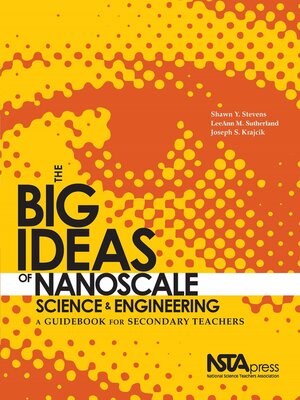The Big Ideas of Nanoscale Science and Engineering
ebook ∣ A Guidebook for Secondary Teachers (PDF e-book)
By Shawn Y. Stevens

Sign up to save your library
With an OverDrive account, you can save your favorite libraries for at-a-glance information about availability. Find out more about OverDrive accounts.
Find this title in Libby, the library reading app by OverDrive.



Search for a digital library with this title
Title found at these libraries:
| Library Name | Distance |
|---|---|
| Loading... |
Given the ability of nanoscience and nanotechnology to exploit the
unique properties that matter exhibits at the nanoscale, the research
resulting from these emerging fields is poised to dramatically affect
everyday life. In fact, many widely used electronic, pharmaceutical,
cosmetic, and textile products already employ nanotechnology.
With the support of the National Science Foundation, scientists,
educators, researchers, and curriculum developers have achieved a rough
consensus on what the key concepts—or "big ideas"—of nanoscience
might be for middle and high school science students:
Size and Scale
Structure of Matter
Forces and Interactions
Quantum Effects
Size-Dependent Properties
Self-Assembly
Tools and Instrumentation
Models and Simulations
Science, Technology, and Society
This volume provides in-depth discussions of each big idea. Nine additional chapters examine learning goals and how to reach them, students' likely misconceptions, and ideas for integrating nanoscale science and engineering with traditional science content. An appreciation of nanoscience will help students understand fundamental science concepts across disciplines. Also, learning the enormous implications of the extremely tiny nanoscale phenomena will pique students' interest in the study of 21st-century science and at the same time motivate them to learn traditional science.
This volume provides in-depth discussions of each big idea. Nine additional chapters examine learning goals and how to reach them, students' likely misconceptions, and ideas for integrating nanoscale science and engineering with traditional science content. An appreciation of nanoscience will help students understand fundamental science concepts across disciplines. Also, learning the enormous implications of the extremely tiny nanoscale phenomena will pique students' interest in the study of 21st-century science and at the same time motivate them to learn traditional science.







